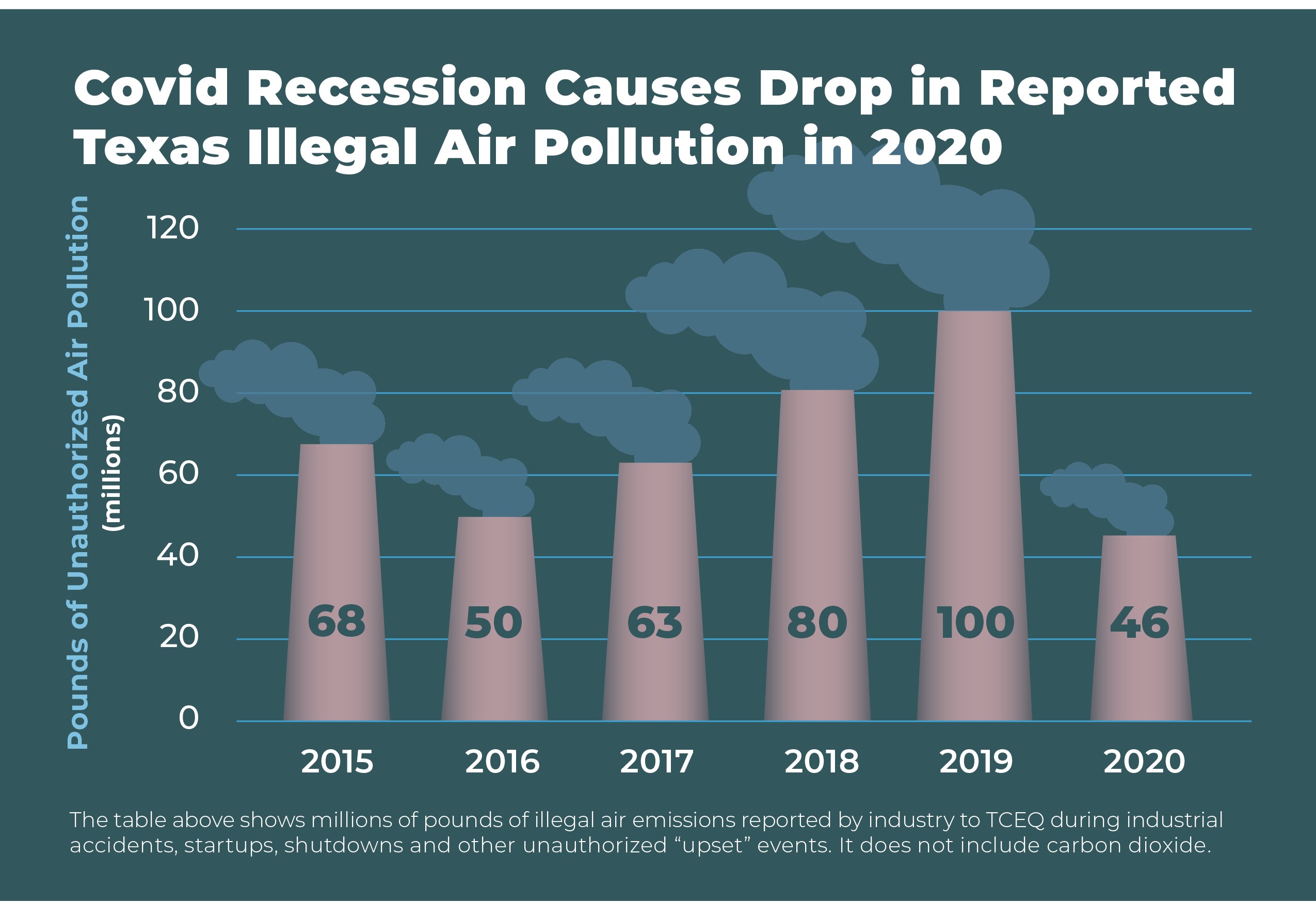Illegal Air Pollution in Texas, 2020
COVID recession leads to drop in reported emissions
A recession across the oil, gas, and petrochemical industries caused in part by the COVID19 pandemic led to a decline in production. This pandemic-driven slowdown in production caused a drop in unauthorized emissions in 2020, according to a report by the Texas Commission on Environmental Quality. Preliminary 2021 industry emissions reports indicate that the pollution drop is likely to be short lived unless state and federal regulators ramp up environmental enforcement and eliminate pollution loopholes.
Every year, oil, gas, and petrochemical operations across Texas release millions of pounds of unauthorized air pollution in violation of their permits during equipment malfunctions, shutdowns, and startups. Known as upsets, or “emission events,” Texas industrial plants release a number of different dangerous pollutants, including butadiene, benzene, particulate matter, and hydrogen sulfide. Whether originating from West Texas oilfields or Gulf Coast industrial facilities, these pollution events degrade air quality and often occur adjacent to residential neighborhoods. The ongoing failure of state regulators to crack down on the unpermitted emissions exposes Texans to unnecessary risks from harmful air pollution.
According to our analysis of unauthorized, unpermitted emissions self-reported by companies to the Texas Commission on Environmental Quality (TCEQ), industrial facilities released more than 46 million pounds of illegal air pollution in 2020, a decrease of 54 percent from 2019 and significantly below the average of 72 million pounds over the last five years. Emissions dropped in each of TCEQ’s 16 regions except one. In the Dallas Fort Worth region, unauthorized air pollution increased by 37 percent from 2019 to 2020.

A recession across the oil, gas, and petrochemical industries caused in part by the COVID19 pandemic led to a decline in production. This pandemic-driven slowdown in production caused a drop in unauthorized emissions in 2020, according to a report by the Texas Commission on Environmental Quality. Preliminary 2021 industry emissions reports indicate that the pollution drop is likely to be short lived unless state and federal regulators ramp up environmental enforcement and eliminate pollution loopholes.
This analysis is drawn only from self-reported violations that were submitted to TCEQ through the State of Texas Environmental Electronic Reporting System (STEERS) for pollution releases during industrial accidents, shutdowns, startups and unplanned maintenance. The numbers do not include pollution from unreported emissions events or from excess emissions that occur during normal, daily operation of industries. For this reason, the numbers in this report significantly under-represent the amount of illegal air pollution released in Texas.
Key Findings:
- In 2020, companies reported 2,980 breakdowns, malfunctions, and other unauthorized air pollution events that resulted in the release of over 46 million pounds of illegal air pollution, a decrease of 54 percent from 2019.
- The Midland region of West Texas reported by far the largest quantity of unauthorized emissions at 30.7 million pounds, nearly six times more than the next highest region, Houston, which reported 5.5 million pounds. This discrepancy highlights how supposedly small sources of air pollution, like oil and gas wells, release as much or more pollution during equipment breakdowns as large factories but escape factory-style regulation because they claim to be minor or “insignificant” polluters.
- In 2020, TCEQ and the state financially penalized companies for 155 unauthorized air pollution events, a 30 percent increase from the 119 penalties in 2019.
- The worst individual polluters in the state, listed by type of emissions and including only breakdowns and other “upset” emissions, were the following: The Valero Corpus Christi Refinery East Plant in Nueces County emitted the most benzene Industrial facilities in Texas released over 46 million pounds of unauthorized pollution in 2020. 5 (7,136 lbs.); The Martin County Gas Plant in West Texas released the most nitrogen oxides (601,926 lbs.); The National Container Group facility in Harris County, near Houston, released the most particulate matter (265,000 lbs.) For more, see Top 10 lists on pages 7-10.
Recommendations:
- Texas should more vigorously and consistently penalize facilities that report unauthorized emissions events to create a stronger financial incentive for plant owners to operate and maintain, or upgrade, their facilities and protect public health. To this end, the TCEQ should better define “Excessive Emissions Events” to include any emissions that could have been avoided or that degrades air quality; adopt mandatory minimum fines; and eliminate the “affirmative defense” loophole as required by EPA.
- Texas should require all sources, but especially repeat violators, to provide evidence supporting any claim that malfunctions resulting in illegal pollution releases are not preventable before deciding not to pursue enforcement actions for penalties and cleanup.
- Texas should establish additional pollution monitors to accurately measure air quality impacts from unauthorized industrial emissions. The state should also work with federal and local agencies to implement continuous monitoring requirements for toxic pollutants.
- Texas should improve the TCEQ STEERS database reporting system and instructions so that facilities report uniformly, accurately, and in a way that enables the public to easily determine the amount and type of pollution released during unauthorized events.
- Texas should provide emergency alerts to community members who ask for notification of releases of toxic chemicals by manufacturing plants.
- Texas should require repeat violators to undergo a 3rd party audit to identify changes in source design and operation that would reduce the frequency and severity of illegal pollution releases in the future and require violators to implement improvements identified through the audit process.

